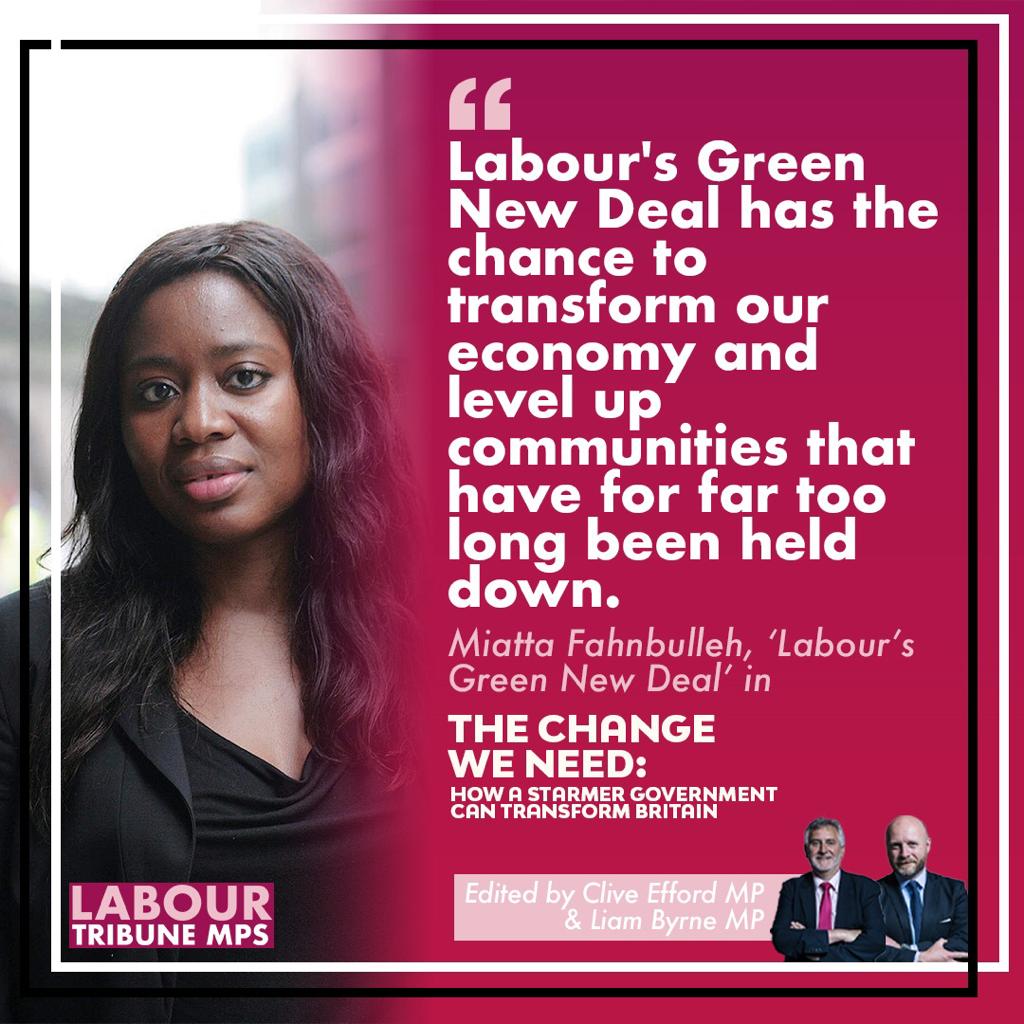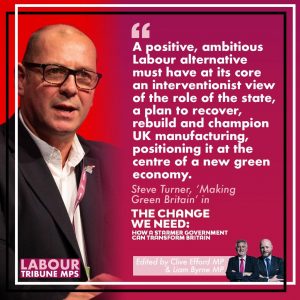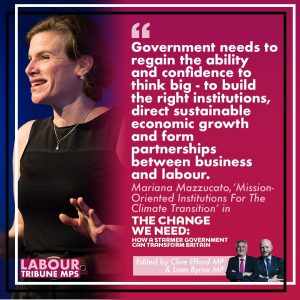How Labour’s Plan for Public Investment Can Deliver Climate Action to Transform our Economy
At a time when we are buffeted from one crisis to the next, it could be easy to put climate change on the back burner. But the imperative to tackle climate change remains just as urgent. The science is clear: we must halve carbon emissions in the next 10 years to limit temperature rises to 1.5°C1. But this is a global average and will require much steeper emissions reductions in industrialised countries than in developing countries. 2 At the same time, we have been warned that nature more broadly is declining globally at rates “unprecedented in human history.”3 The more environmental breakdown remains unchecked, the more chaos in the system: more devastating hurricanes, record droughts, extreme floods, the coastline disappearing, food scarcity from loss of crop-yield and fisheries – all driving climate related poverty across the world at a scale we can’t even imagine. The cost of this not just in pounds but in human suffering will be immense. Therefore, the choice before us is whether we take deliberate action now to achieve the change we need, or we sleepwalk into a crisis and panic in response when it will be too late.
The Labour Party has made its choice, with its commitment to a Green New Deal. But at the heart of this Green New Deal must be a recognition that the race to tackle climate change should come hand in clove with a major drive to reform the economy so it works for everyone. That means transitioning to net zero in a way that reverses the trend of the last 15 years in which living standards for the majority have been squeezed and our communities held back. Put simply, to tackle climate change, we must transform the economy. The ambition is clear, but the big question is what must Labour do to make this a reality?
First, it must commit to the scale of public investment needed. There is no path to net zero without public investment. The question is whether we do this as a part of deliberate and proactive strategy to adapt our economy as we decarbonise or we do this in a panic as the impacts of climate change begin to bite. Labour has grasped this with its pledge to invest £28bn a year in the green transition. This is a welcome first step. But Labour should seek to leverage this investment by aligning the mandates of existing state-owned financial institutions – the UK Infrastructure Bank (UKIB), the British Business Bank (BBB) and the UK Export Finance (UKEF) – with the Green New Deal. Taken together, these institutions investment billions every year and could play a more active role in guiding the UK economy towards net zero. This would ensure that the state was using its full financial firepower to unleash the benefits of a Green New Deal. And when combined with a clear mandate for the Bank of England to make climate considerations central to its operations, this would bend financial markets that have been slow to respond to the climate imperative and unlock the scale of investment needed to green our economy and help businesses and families to transition.
Second, large scale investment must be matched by equally ambitious action at the local level. We cannot transition to net zero in a way that is just without empowering and equipping those at the local level to respond. If we simply push out investment from the top, we may hit our decarbonisation targets, but we are unlikely to do this in a way that protects and supports the communities that will be impacted by this transition. £12 billion a year should be devolved to regional and local authorities to invest in the green infrastructure and services they need from public transport, nature conservation to the circular economy. This should be matched by regional carbon budgets, binding targets for net zero, and a statutory duty to develop green industrial strategies that aim to deliver good jobs that pay a decent wage. But to make these strategies bite, there must also be a radical devolution of power and funding for education, skills, employment support, energy, housing, planning and local transport. This would give local leaders the tools they need to change their local economies so its works for people and planet. In return for these powers, local leaders must work with their community, trade unions and local businesses to define what success looks like, develop a shared just transition plan for their areas and create new ways of doing things, tapping into the energy and ideas bubbling up from the ground. This will give local people a direct say over how the local economy should be made to work in their interest as we transition.
Third, we must upgrade and expand the green infrastructure we need for the future. At the forefront of this will be clean energy and public transport. These are public goods that are fundamental to getting the transition right, so must be owned by communities and work in their interest. This would create a route to giving people a direct stake in the green economy of the future and build and distribute community wealth. To ensure there is a guiding mind driving the shift to clean energy, National Grid should be brought fully into public ownership and tasked with modernising the network and managing the energy transition. Regional public sector backed co-operatives, owned by consumers and workers, should be set up to generate, transmit and sell clean energy. If combined with municipal and community energy schemes, we could flood the country with clean energy at pace and transform our energy system. But the energy sector of the future must be built around the principle that energy is an essential good and everyone should have access to free basic energy. This would ensure everyone covers their minimum energy needs for free and then we pay a rising tariff the more energy we use. Similarly, there must be a step change in decarbonising our transport system. While other sectors such as energy have made significant progress in decarbonisation, the share of the UK’s annual carbon emissions taken up by transport has nearly doubled since 1990.4 Legal targets and regulation to ban petrol and diesel will begin to shift behaviours, but if we want people to get out of their car, we need to make alternative as affordable and accessible as possible. This means expanding the public transport network to ensure low-cost buses, trains, trams and community transport across our communities to created connected places.
Finally, we need a new generation of green homes. Across the UK, millions of homes are in need of upgrading to make them warmer, less draughty and damp. But insulating homes is costly and disruptive which puts many people off. There is no credible pathway to net zero without energy efficiency and low-carbon heating from electricity, at scale. To get there, we need a Great Homes Upgrade – a national effort, backed by investment, to retrofitting 19 million by 2030. This should be delivered by regional and local authorities, working street by street, to upgrade homes whilst improving the look and feel of the neighbourhood. Alongside upgrading our existing stock, we need to build the green homes of the future. We must build 3 million social homes in the next two decades to fix the housing crisis. Why not make these zero carbon homes? This would create the next generation of social homes, provide homes that are cheaper and greener to run, and modernise our construction sector at scale.
Labour’s Green New Deal, with its commitment to invest £28 bn of capital a year, could be a gamechanger. Done right, it will take carbon out of our economy in a way that revives our communities, creates hundreds of thousands of jobs and builds community wealth. Capital investment is key to unlocking this, but it is not enough. Investment in the infrastructure and wiring for the green transition must be combined with invest in people and the social infrastructure required to ensure that this transition is just. This will be critical for workers and communities at the sharp end of this change to get a fair deal. A Future Skills Scheme, for example, would allow firms transitioning to reduce the hours their employees work while providing income support and training, allowing their workers to use non-work hours to retrain and upskill for jobs in sectors that are growing. But this won’t happen without government backing.
If Labour ups its commitment so that it can invest in the people whose interest this transition must work, its Green New Deal has the chance to transform our economy and level up communities that have for too long been held down. And that’s a price worth paying.





